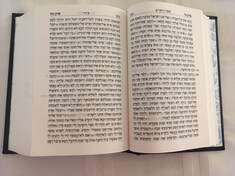
Unlock the Treasures
“Reading a poem in translation is like kissing a woman through a veil.”
So said the great Hebrew writer Hayim Nahman Bialik.
We are captives of our language. That is particularly true of our understanding of Judaism. We think we know what our texts mean, but, when read in English, we are only appreciating them through the filter of our language.
Language contains within it a world view. Yes, we can pray in English. Yes, we can study Torah in English. But we are missing the associations, the resonance of the text itself.
- Puns: “Your name is to be Abraham, for I am making you the father of a multitude of nations” doesn’t make any sense in English, but in Hebrew, “Abraham” sounds like “father of many nations.”
- Words built on common roots: Kiddush (the blessing over wine for Shabbat), Kaddish (the prayer recited by mourners) and Kiddushin (the wedding ceremony) are all related concepts (that which is set aside), something that cannot be recognized by calling them by their English names.
- Acrostics: Ashrei, based on Psalm 145, is a poem in our prayer book that works as an acrostic, but entirely loses that device the moment it is translated.
This hardly scratches the surface of what is missing, or, for that matter, what is entirely misunderstood in translation.
As the expression goes: A translator is a traitor. (Actually, it goes “traduttore traditore.”)
The key to unlocking the treasures of Judaism is Hebrew. And learning Hebrew is easily within your reach, particularly the basic vocabulary that can make prayer understandable.
It’s not just meaning: knowing some Hebrew can enable you to see the beauty in the language of prayer.
Whether you are a beginner, or someone who needs a refresher, we offer a class for adults to learn Hebrew, starting with Alef-Bet, learning to read the Hebrew alphabet. It’s simple, fun, and instantly rewarding.
Beth Emek's Hebrew classes are listed here. Just about every synagogue offers Hebrew. Check the website of the synagogues around you.
 RSS Feed
RSS Feed